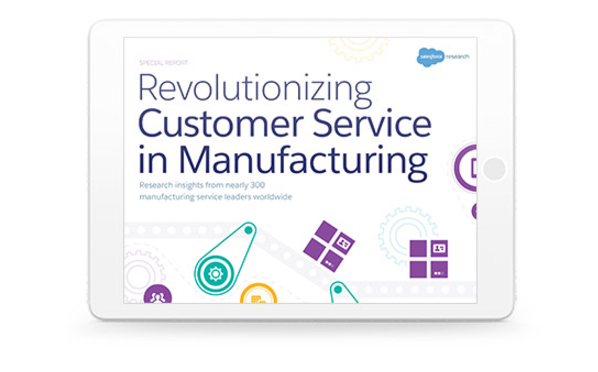Today, the customer is well and truly king. And their service demands reflect their growing power, with the vast majority expecting companies to respond and interact with them in nothing less than real-time.
For manufacturers everywhere, this means pulling out the stops to maximise the productivity – and capabilities – of their service teams, meaning greater operational efficiencies, and ultimately better customer service.
But, as our recent research report shows, many manufacturers are rising to the challenge. Over the last 24 months, two-thirds have upped the budgets of their service teams – and even more (69%) are forecasting an increase in the coming two years.
In their drive to deliver the kind of service that customers expect, and competitors can’t match, top manufacturers are harnessing three major tech trends…
1. Productivity-boosting trend #1: Mobile
Nothing boosts productivity like giving service teams a comprehensive, up-to-date and easy-access view of every customer and their product information. Nothing, except giving them that view, whether they’re sat at a desk, at a motorway services, or with a customer, resolving their issue face-to-face. If providing fast answers and real-time insights for every team member is a priority (and how could it not be?), then having best-in-breed mobile customer service apps is they only way.
Top performing manufacturing service teams are 1.9x more likely than their underperforming peers to have that comprehensive, up-to-date view. But they’re also 2.2x more likely to equip their agents with mobile apps.
Those that do are clearly seeing the impact on productivity – 69% agree providing mobile apps accelerates service resolution.
Boosting Service Productivity at Coca-Cola Enterprises
Serving eight territories in Western Europe, Coca-Cola Enterprises (CCE) is one of the world’s largest Coca-Cola bottlers.
CCE has succeeded in driving service team productivity with the support of a mobile app developed on Service Cloud and the Salesforce Platform. As Kemal Cetin, an IT Vice President at CCE, explains:
“The app makes it easier and quicker for service technicians to retrieve their work schedules and log activity updates in real time, which means they can respond to more customer requests in the same timeframe. This is a crucial capability as CCE expands its Equipment Service offering to a broader customer base.”
2. Productivity-boosting trend #2: AI
Delegating tasks has always been a way to get more done in your day. But now, top manufacturing services teams are delegating to the machines.
From case classification and intelligent routing to forecasting resolution time and service capacity, there’s a host of ways in which AI can help customer service teams move faster and smarter.
Today’s highest performing teams are 2.1x more likely to excel at using AI right now, and they’re also the ones with the vision to see its ultimate potential – 3.3x more likely to say AI will have had a transformational impact on their service organisation by 2020.
AI in action at Kone
At Finnish elevator and escalator manufacturer KONE, predictive intelligence is revolutionising how KONE monitors and maintains customer’s equipment. In future, that equipment data will be routed to Salesforce Service Cloud, to create work orders for service and possible repair, making systems more proactive, not reactive.
AI can anticipate faults before they even happen, automatically flagging to a customer service agent or service engineer to resolve the issue, supporting faster, better informed, customer interactions.
3. Productivity-boosting trend #3: IoT
Connecting your products and service teams can be a massive productivity win.
When the industrial washing machine you made reports a fault of its own accord – before that fault can develop into a full-blown breakdown – everyone feels the benefits. Your customer barely feels the disruption, and your service engineer has a much quicker fix, and can move onto her next job in no time at all.
It’s unsurprising then, that more and more manufacturers are deploying connected devices, and embracing more predictive, proactive service. Are talking elevators a sign of things to come?
The trend is clear, and meteoric:
- 27% of manufacturing services teams used IoT in 2015
- 58% used IoT in 2016
That’s 119% growth, in just 12 months. And when you look at the results manufacturing services teams are seeing with IoT, the rapid adoption is easy to understand. At least two thirds of teams using IoT say it’s very beneficial to predicting customer needs and offering proactive service.
Boosting service productivity at Zero Motorcycles
Zero Motorcycles – the industry leader in high-performance electric motorcycles – is one manufacturer that’s using connected products to revolutionise service delivery.
If an owner finds they’ve a mechanical problem, Zero’s service agents are able to access key data and diagnose the issue, wherever the motorcycle is. The result? 50% faster response for emergency service, and a 25% reduction in support tickets.
Discover how else manufacturers are revolutionising service…
Download our special report, Revolutionising Customer Service in Manufacturing, and get a whole world of additional insight – based on interviews with nearly 300 manufacturing service leaders. You’ll learn how Sales and Service teams are joining forces to deliver unified, personalised experiences – and the most common obstacles standing in their way.








